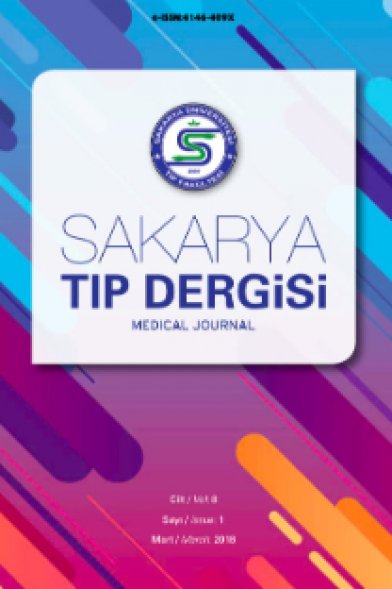Hashimoto Tiroiditi ile COVID-19 Enfeksiyonu Gidişatı Arasındaki İlişkinin İncelenmesi
COVID-19, Hashimoto Tiroiditi;, Otoimmun Tiroid Hastalığı
Evaluation of the Relationship Between Hashimoto's Thyroiditis and the Course of COVID-19 Infection
COVID-19, Hashimoto, Autoimmune Thyroid Disease,
___
- Chen W, Tian Y, Li Z, Zhu J, Wei T, Lei J. Potential Interaction Between SARS-CoV-2 and Thyroid: A Review. Endocrinology. 2021;162(3):bqab004.
- Duntas LH, Jonklaas J. COVID-19 and Thyroid Diseases: A Bidirectional Impact. J Endocr Soc. 2021;5(8):bvab076.
- Li MY, Li L, Zhang Y, Wang XS. Expression of the SARS-CoV-2 cell receptor gene ACE2 in a wide variety of human tissues. Infect Dis Poverty. 2020;9(1):45.
- Șandru F, Carsote M, Petca RC, Gheorghisan-Galateanu AA, Petca A, Valea A, et al. COVID-19-related thyroid conditions (Review). Exp Ther Med. 2021;22(1):756.
- Ragusa F, Fallahi P, Elia G, Gonnella D, Paparo SR ,Giusti C,et al. Hashimotos’ Thyroiditis: Epidemiology Pathogenesis Clinic and Therapy. Best Pract Res Clin Endocrinol Metab. 2019;33(6):101367.
- Dworakowska D, Grossman AB. Thyroid disease in the time of COVID-19.Endocrine. 2020;68(3):471-474.
- Speer G, Somogyi P. Thyroid complications of SARS and coronavirus disease 2019 (COVID-19).Endocr J. 2021;68(2):129-136.
- Kakodkar P, Kaka N, Baig MN. A comprehensive literature review on the clinical presentation, and management of the pandemic coronavirus disease 2019 (COVID-19). Cureus 2020;12(4):e7560.
- Stokes EK, Zambrano LD, Anderson KN, Marder EP,Raz KM, Felix SEB.et al. Coronavirus Disease 2019 Case Surveillance - United States, January 22-May 30, 2020. MMWR Morb Mortal Wkly Rep.2020;69(24):759-765.
- Cunningham JW, Vaduganathan M, Claggett BL, Jering KS, Bhatt AS, Rosenthal N Clinical Outcomes in Young US Adults Hospitalized With COVID-19. JAMA Intern Med.2020;181(3):379-381.
- Güner R, Hasanoğlu İ, Kayaaslan B, Aypak A, Kaya Kalem A, Eser F et al. COVID-19 experience of the major pandemic response center in the capital: results of the pandemic's first month in Turkey.Turk J Med Sci. 2020;50(8):1801-1809.
- Coperchini F, Chiovato L,Croce L,Magri F,Rotondi M. The cytokine storm in Covid-19: an overview of the involvement ofthe chemokine/chemokine-receptor system. Cytokine Growth Factor Rev.2020;53:25-32.
- Muller I,Cannavaro D, Dazzi D, Covelli D,Mantovani G,Muscatello A. et al. SARS-CoV-2-related atypical thyroiditis. Lancet Diabetes Endocrinol.2020;8(9):739-741.
- Zhang Y, Lin F, Tu W, Zhang J, Choudhry AA, Ahmed O.et al Thyroid dysfunction may be associated with poor outcomes in patients with COVID-19. medical team from Xiangya Hospital to support Hubei, China. Mol Cell Endocrinol. 2021;521:111097.
- Georges JL, Cochet H, Roger G,Jemaa HB, Soltani J, Azowa J-B et al. [Association of hypertension and antihypertensive agents and the severity of COVID-19 pneumonia. A monocentric French prospective study]. Ann Cardiol Angeiol (Paris).2020;69(5):247-254.
- Hariyanto TI, Kurniawan A. Thyroid disease is associated with severe coronavirus disease 2019 (COVID-19) infection.Diabetes Metab Syndr. 2020;14(5):1429-1430.
- Lagadinou M, Zareifopoulos N, Karela A, Kyriakopoulou O, Velissaris D. Are patients with autoimmune disease at greater risk of developing severe COVID-19? J Clin Med Res.2020;12(8):539-41.
- Daraei M, Hasibi M, Abdollahi H, Hazaveh MM, Zebaradst J, Hajinoori M, et al Possible role of hypothyroidism in the prognosis of COVID-19. Intern Med J.2020;50(11):1410-1412.
- Van Gerwen M, Alsen M, Little C,Barlow J ,Genden E, Naymagon L,et al. Risk factors and outcomes of COVID-19 in New York City; a retrospective cohort study. J Med Virol.2021;93(2):907-915.
- Brix TH, Hegedüs L, Hallas J, Lund LC. Risk and course of SARS-CoV-2 infection in patients treated for hypothyroidism and hyperthyroidism.Lancet Diabetes Endocrinol.2021 ;9(4):197-199.
- Güven M, Gültekin H. The prognostic impact of thyroid disorders on the clinical severity of COVID-19: Results of single-centre pandemic hospital. Int J Clin Pract. 2021 ;75(6):e14129.
- Lisco G, De Tullio A, Jirillo E, Giagulli VA, De Pergola G, Guastamacchia E et al. Thyroid and COVID-19: a review on pathophysiological, clinical and organizational aspects.J Endocrinol Invest. 2021;25:1-14.
- Yayın Aralığı: 4
- Başlangıç: 2011
- Yayıncı: Sakarya Üniversitesi
Fetal Gelişim ve Büyümede Apelinin Rolü
Nevin TÜTEN, Koray GÖK, Mine KUCUR, Abdullah AÇIKGÖZ, Abdullah TÜTEN, Mahmut ONCUL
İmmunoglobulin A Vasküliti Referans Merkez Deneyimi: MEFV Gen Mutasyonunun Klinik Spektruma Etkisi
Zahide EKİCİ TEKİN, Elif ÇELİKEL, Fatma AYDIN, Tuba KURT, Nilüfer TEKGÖZ, Müge SEZER, Cüneyt KARAGÖL, Serkan COŞKUN, Melike KAPLAN, Nimet ÖNER, Merve Cansu POLAT, Banu ACAR
Sema KOÇAN, Leyla KAZANCIOĞLU, Yağmur DEMİREL, Canan ALTINSOY
Duygu AYAR, Fatma KARASU, Aliye BULUT
Lohusaların Doğum Şekline Göre Doğum Sonu Fonksiyonel Durumlarının Karşılaştırılması
Pınar KARATAŞ, Serap EJDER APAY
Omurga Deformite Cerrahisinde Kullanılan Ultrasonik Kemik Kesicilerin Etkisi
Amet Çağrı UYAR, Mümin KARAHAN, Alper GÜLTEKİN
Yalın Üretim Sistemlerinin Hasta Antimikrobiyal Duyarlılık Testlerine Uygulanması
Burak KÜÇÜK, Gökhan ARICAN, Hacer ARIKAN, Murat ARAL
Pandemi Koşullarında Gastrointestinal Endoskopi Pratiği
Şencan ACAR, Mustafa SADEÇOLAK, Mukaddes TOZLU, Ahmet Tarık EMİNLER
Sena SERT, Lale dinç ASARCIKLI, Aycan ESEN, Altuğ ÖSKEN, Barış ŞİMŞEK, Aysel YAĞMUR, Barış GÜNGÖR, Özlem YILDIRIMTÜRK
